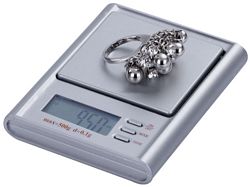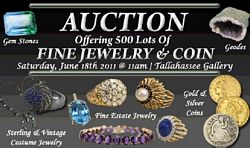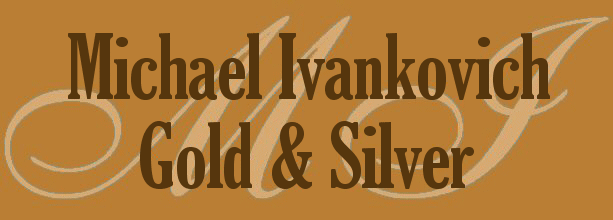|
Weigh
Your Precious Metals: The first step in determining where
to sell is to calculate the estimated "Scrap Value"
of what you have. We covered this process in great detail in our
articles titled "The Michael Ivankovich Guide to Selling
Gold & Silver: How the Scrap Game Is Really Played",
so we're not going to review that again here. If you missed those
articles, you can find them on our www.MichaelIvankovichAppraisals.com
website, or elsewhere on this web site.
So before you do anything else, weigh your items.
- Determine
the Gross Weight in Troy Ounces, Pennyweights
or Grams.
- Determine
the Amount of Pure Gold or Pure Silver.
- Determine
the Spot Gold or Spot Silver Price.
- Determine
the Percent of Spot Price Payment Factor that
the dealer will pay.
This
will give you the estimated "Scrap Value" of
what you have. And this will serve as a starting point when considering
whether to "Scrap It", "Sell It Outright"
or "Auction It".
* * * * * * * * * * * *
* * * * * * * * * *
Scrap
Option: When considering the "Scrap" option,
ask yourself these very basic questions:
- What
is the Condition? Items that are damaged, broken, dented,
or blemished are difficult to sell and scrapping is often the
easiest and best option.
- Is
it Common or Rare? Common items are tougher to sell,
and they rarely bring top dollar at Auction. For example, there
are many more sterling silver tea spoons and dinner forks in
circulation than sterling asparagus servers or sterling coffee
pots. Some patterns are very common, while others are rare and
extremely desirable. Scrapping is often the best approach for
common items.
- Is
it a Partial or Incomplete Set? Incomplete flatware
sets, single candlesticks, or individual carving set pieces
can be difficult to sell and should often just be scrapped.
- Who
is the Maker? Collectors collect "The Name".
Unsigned pieces, or items from less desirable makers, are harder
to sell and scrapping is often the easiest option.
- What
is the Age? Mid-Late 20th century items are more plentiful
than early antique items, are usually more difficult to sell,
and scrapping is often the best option.
- Any
Combination of These Variables: An incomplete set, of
recent vintage, of a very common pattern, made by an unknown
or undesirable maker, and in poor condition, should probably
be scrapped.
Advantages
of Scrapping: You can convert it into cash immediately; today,
if you like. You can simply sell it and walk out with cash in
hand. There are no commissions, no waiting, and no uncertainty.
Disadvantages of Scrapping: Are you being paid a fair price?
If you've done your homework, this should not be a problem because
you will understand value before you walk into the store.
If you don't do your homework, if you don't understand value,
expect to be taken advantage of. Also remember that you will be
paid for the precious metal value only; you will receive nothing
for the intrinsic value.
The Bottom Line Is This: If what you have is not the type
of thing that most people would be interested in purchasing, it
may be better to "Scrap It" than to "Sell
It Outright" or "Auction It".
* * * * * * * * * * * *
* * * * * * * * * *
 Outright
Sale Option: Once you know the Scrap Value, you are
dealing from a position of strength. Any reasonable offer above
the Scrap Value is money in your pocket and you should
consider selling it and pocketing the difference. Understand that
almost any buyer will be expecting to re-sell at a profit. And
that's ok, as long as they are making a "fair"
profit, and not an "obscene" profit, at your
expense. If you want "Top Dollar", be prepared
for all of the added work and expense that comes along with becoming
a dealer. Outright
Sale Option: Once you know the Scrap Value, you are
dealing from a position of strength. Any reasonable offer above
the Scrap Value is money in your pocket and you should
consider selling it and pocketing the difference. Understand that
almost any buyer will be expecting to re-sell at a profit. And
that's ok, as long as they are making a "fair"
profit, and not an "obscene" profit, at your
expense. If you want "Top Dollar", be prepared
for all of the added work and expense that comes along with becoming
a dealer.
Advantages of Outright Sale: For most people, immediate
cash in hand, at an amount higher than scrap value, with no commissions,
with no risks, with no delays, is usually preferable to a delayed
Auction sale, at an unknown amount, with all related selling expenses.
Disadvantages of Outright Sale: In today's soft Antiques
& Collectibles market, selling at a price greater than Scrap
Value is not as easy as it was several years ago. Dealers are
generally selling less, and paying less, than they did several
years ago, and are not as interested in tying up their money while
waiting to find a retail buyer. They are almost always seeking
to pay "below-scrap prices", and are generally
more reluctant to pay "scrap-plus prices". And
what if it's worth more at Auction?
The Bottom Line Is This: If you can find a dealer willing
to pay more than Scrap Value, if it's a fair offer, you
should probably consider it. But if you can't find someone who's
willing to pay you more than Scrap Value, perhaps you should
at least consider the Auction Option.
* * * * * * * * * * * *
* * * * * * * * * *
Auction
Option: At this point you know the Scrap Value of your
precious metals. And you have considered the Outright Sale
option. Now the final question is whether you take the cash and
run, or do you roll the dice and send it to Auction.
 "Auction"
sells things in a competitive bidding situation. The more desirable
the item, the more people who will be interested in owning it,
the higher the final selling price. Auction is where most record
prices are set. The Dynamics of Auction and the Power
of Competitive Bidding can often result in higher prices than
can be achieved anywhere else. "Auction"
sells things in a competitive bidding situation. The more desirable
the item, the more people who will be interested in owning it,
the higher the final selling price. Auction is where most record
prices are set. The Dynamics of Auction and the Power
of Competitive Bidding can often result in higher prices than
can be achieved anywhere else.
However, "Commission", "Delivery Expense",
and "Absolute Auction" must all be considered
when selling at Auction.
Before consigning to any Auctioneer, ask yourself the same questions
that you did when you considered the "Scrap"
option.
- Condition?
Undamaged items usually sell well at Auction.
- Rarity?
Rarities are what most buyers are seeking at Auction, and rarities
will usually bring a premium value over Scrap Value.
- Complete
Set? Complete sets will usually sell better at Auction
than partial or incomplete sets.
- Maker
Name? Collectors collect "The Name"
and better names almost always sell better, and command a premium
price over Scrap Value.
- Age?
Antique pieces are rarer than late 20th century items and will
usually sell better at Auction.
- Any
Combination of These Variables: A complete set, of a
very desirable pattern, made by a noted early maker, in excellent
condition, will almost always sell at a higher price than if
any of these factors is missing.
Auction
Rule of Thumb: If the Auction commission is 25%, then the
final Auction selling price must be at least 25% higher
than the "Scrap" or "Outright Sale"
price…just to break even! So to warrant the
added risk of selling at Auction, the potential upside should
significantly exceed the commission rate. And don't forget the
impact of the Buyer's Premium and Sales Tax on Auction
sales.
Other factors that should be considered with the Auction option
are the Auctioneer's reputation, specialty, commission, other
selling expenses, the timing and location of the Auction, etc.
A True Story: Not too long ago I had a client with a set
of silver flatware. We sent it to Auction hoping for $1,800-$2,500,
which was over the Scrap Value. It ultimately sold for
$8,500.00. My client hit a home run. All the factors were right
for Auction: It was a complete set, a very desirable name, a very
popular pattern, in an up silver market. If any of theses factors
were missing, the selling price would probably have been much
softer.
* * * * * * * * * * * *
* * * * * * * * * *
Learning
Points:
- The
precious metals market is strong today and gold & silver
is very easy to sell and convert into cash.
- Precious
metals dealers are different and pay varying percentages of
the daily spot price. Your objective is to locate the one who
is paying the most amount of money.
- Scrapping
is often the best approach for items that are damaged, incomplete
sets, common, not highly desirable, and/or relatively new.
- If
you can locate a private dealer willing to pay you an amount
over the scrap value, you should probably consider the offer.
- Although
Auction has expenses and risks, you can also hit a home run
at Auction.
|



